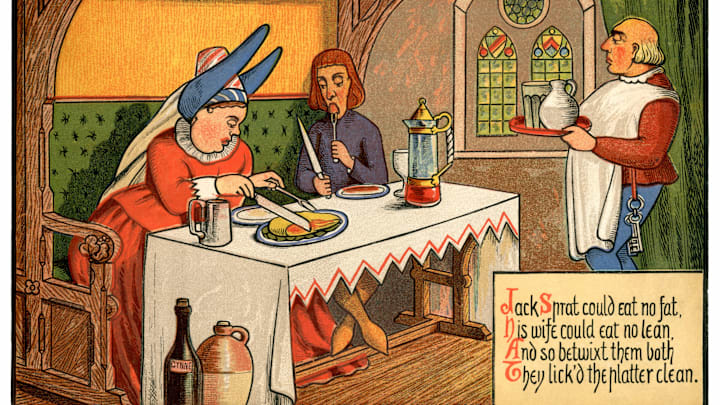The name Jack comes up a lot in nursery rhymes and fairy tales: “Jack and Jill,” “Little Jack Horner,” and “Jack and the Beanstalk” are just a few of the more well-known examples. Although “Jack Sprat” may not be in the nursery rhyme limelight, the two theories behind its meaning—both of which involve royalty—are just as interesting as the origins of better-known children’s poems. But first, here’s a quick refresher of the lyrics if you’ve forgotten them since childhood:
“Jack Sprat could eat no fat
His wife could eat no lean
And so betwixt the two of them
They licked the platter clean.”
The Meat of the Matter
Jack Sprat first appears in print around 1569—it cropped up twice in an anonymously published morality play titled The Marriage of Wit and Science: “Heard you ever such a counsel of such a Jack sprat?” and “ye are but Jacksprat to me.” Although the meaning of the moniker in this context isn’t certain, by 1699 Jack-Sprat is recorded in a slang dictionary as “a Dwarf, or very little Fellow, a Hop-on-my-thumb.” A sprat is also a type of small fish, which may be why it was used to describe people of shorter heights.
The earliest surviving printed record of the “Jack Sprat” nursery rhyme is from John Clarke’s 1639 collection of proverbs: “Jack will eat no fat, and Jill doth love no leane. / Yet betwixt them both they lick the dishes cleane.” Clarke’s book also mentions Sprat in another saying: “Jack sprat teacheth his grandame.”

Twenty years later, James Howell included a different version of the carnivorous-themed rhyme in his collection of proverbs, with Jack Sprat’s name being swapped out for “Archdeacon Pratt”:
“Archdeacon Pratt would eat no fatt,
His wife would eat no lean;
Twixt Archdeacon Pratt, and Ioan his wife,
The meat was eat up clean.”
However, the “Jack Sprat” version is the one that stood the test of time. Its lasting popularity is partly due to its inclusion in Mother Goose’s Melody; or Sonnets for the Cradle, an influential 18th-century book of nursery rhymes that helped popularize the Mother Goose figure. Each of the rhymes in this book—which includes “High Diddle Diddle” and “Baa, Baa, Black Sheep”—is accompanied by a maxim; the ditty about Jack Sprat and his wife feasting on meat apparently teaches the lesson that it is “Better to go to bed supperless, than rise in debt.”
Although the “Jack Sprat” rhyme often totals just four lines, other verses were written throughout the years. In 1849, James Halliwell-Phillipps printed a lengthy version of the tale, which he states “appears to be of some antiquity.” In this extended version of the rhyme, Jack Sprat courts and marries Joan Cole and the following verses largely detail the various animals—including a duck, pig, and cow—that the couple kill or keep.
Fit For a King
Classic children’s nursery rhymes were sometimes inspired by real historical events, and while “Jack Sprat” may simply be about a fictional couple whose eating habits complement each other, there are two theories as to who the tune might actually be referencing.

First up, it has been speculated that Jack Sprat and his wife are allusions to King Charles I and his Queen, Henrietta Maria of France, who ruled during the 17th century. Parliament restrained Charles’s spending on wars, which left him financially lean. Some versions of this theory then blame Henrietta for raising taxes (i.e. getting some fat) and picking the state and its people clean, while others pin it on both royals. Charles was also only around 5 feet tall, which could explain the possible use of the name Jack Sprat.
The second theory concerns Richard the Lionheart and his brother, Prince (and later King) John—who, along with the Sheriff of Nottingham, is one of the villains of the Robin Hood tales. The simplest version of this theory leaves Richard I out, focusing only on John—who came into power when his older brother left England to join the Third Crusade—and his wife, Isabella, Countess of Gloucester. Isabella was allegedly greedy, hence the rhyme’s reference to the wife eating the fat.
The addition of Richard to this theory involves him being captured in 1192 by Leopold V, Duke of Austria. The English king was then handed over to Henry IV, King of Germany and Holy Roman Emperor, and a ransom of 150,000 marks was demanded for his return. John reluctantly raised the money (well, most of it), which left the country’s coffers licked clean like the platter/dish from the rhyme.
Read More About Nursery Rhymes:
